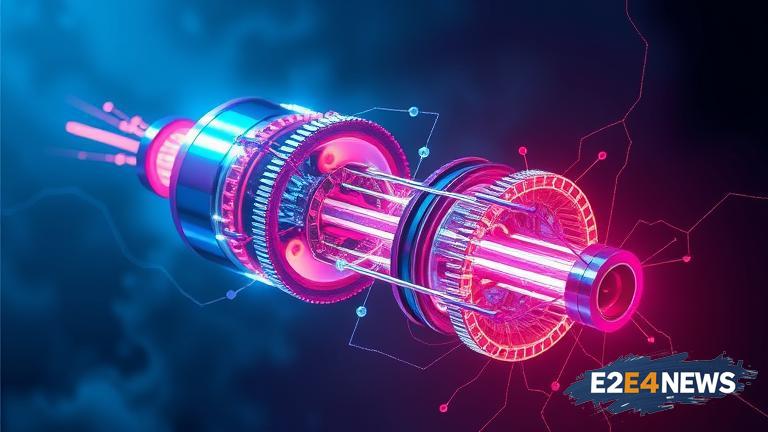A team of scientists has been working on a novel approach to create a quantum thermochemical engine that can harness the power of quantum mechanics to achieve high efficiency. This innovative engine has the potential to revolutionize the way we generate power, enabling the creation of more efficient and sustainable energy systems. The researchers have been exploring the properties of quantum systems and their ability to interact with thermal energy, which could lead to a significant breakthrough in the field of thermodynamics. By leveraging the principles of quantum mechanics, the team has been able to design an engine that can operate at the quantum level, allowing for the conversion of thermal energy into useful work with unprecedented efficiency. The quantum thermochemical engine is based on the concept of quantum coherence, which enables the engine to maintain a high level of efficiency even at high power output. This is achieved through the use of quantum entanglement, which allows the engine to harness the power of quantum fluctuations to generate energy. The researchers have been using advanced computational models and simulations to study the behavior of the quantum thermochemical engine and optimize its performance. The results of these simulations have been promising, indicating that the engine could achieve high power output with near-maximum efficiency. The potential applications of this technology are vast, ranging from the development of more efficient power generation systems to the creation of advanced propulsion systems for space exploration. The quantum thermochemical engine could also have a significant impact on the field of materials science, enabling the creation of new materials with unique properties. Furthermore, the engine could be used to study the behavior of quantum systems in extreme environments, such as high-temperature and high-pressure conditions. The researchers are now working on experimental implementations of the quantum thermochemical engine, which will involve the development of advanced quantum devices and materials. The experimental realization of the engine will require the use of cutting-edge technologies, such as quantum computing and nanotechnology. The team is also exploring the potential applications of the quantum thermochemical engine in various fields, including energy, transportation, and aerospace. The development of this technology could have a significant impact on the global energy landscape, enabling the creation of more efficient and sustainable energy systems. Additionally, the quantum thermochemical engine could play a key role in the development of advanced technologies, such as quantum computing and artificial intelligence. The researchers are confident that their discovery will pave the way for a new generation of high-efficiency energy systems, which could have a profound impact on the environment and the economy. The study of quantum thermochemical engines is an active area of research, with many scientists and engineers working on the development of new technologies and materials. The breakthrough achieved by the researchers is a significant step forward in the field, and it is expected to have a major impact on the development of future energy systems. The quantum thermochemical engine has the potential to revolutionize the way we generate power, enabling the creation of more efficient and sustainable energy systems. The researchers are now working on further optimizing the performance of the engine, which will involve the development of new materials and technologies. The experimental realization of the quantum thermochemical engine will be a major milestone in the development of this technology, and it is expected to have a significant impact on the global energy landscape.





